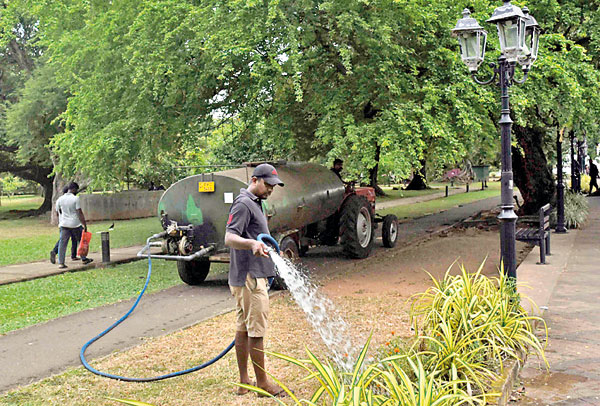News
Water minister cites Rs. 350bn loan to justify tariff hike
View(s):- Disputes Champika’s claims over profit
The Water Supply Ministry has rejected opposition Parliamentarian Patali Champika Ranawaka’s claims that the National Water Supply and Drainage Board (NWSDB) has increased tariff rates, despite making profits.
“The NWSDB is not making a profit. His claim is unfortunately inaccurate and misleading,” Water Supply Minister Jeevan Thondaman told the Sunday Times.
Over the past decade, to provide a quality service to its customers, the NWSDB has borrowed more than Rs. 350 billion (much of it in foreign loans) to invest in water supply infrastructure schemes, the minister said, adding that these borrowings come at a cost.
Following the rapid depreciation of the rupee last year and the increase in interest rates, debt repayment has become an unbearable burden for the NWSDB. Annually, the NWSDB has to pay Rs. 30 billion in capital and interest repayment on its debt. In 2022, the accounting loss for the NWSDB was Rs. 3.2 billion and the outstanding loan payment was Rs. 15 billion, Mr. Thondaman explained.

Water tariff hikes will have an adverse impact on several sectors. Pic by Akila Jayawardena
A tariff revision was done in September 2022 after 10 years, and as a result, the board was able to cover only a part of the NWSDB’s operating expenses. However, owing to the increase in loan interest and operational expenses (mainly due to the 100% increase in electricity costs), the prevailing loan instalments and interest could not be paid by the NWSDB, he said.
With the second electricity tariff increase by the CEB in February this year, the NWSDB requested a tariff revision from the Treasury in March. After several rounds of talks with the Treasury, approval was given only in July, the minister said.
Mr. Thondaman claimed that the NWSDB was due to pay Rs. 24 billion to the local banks as loan instalments and interest by June 30 this year. But it was not able to do so.
When asked about Mr. Ranawaka’s claim, the minister said that following the 2022 tariff revision, a small operating surplus was recorded in the first half of this year.
“An operating surplus is not a profit. Unfortunately, MP Ranawaka has confused this. The surplus will be utilised to pay the outstanding loan instalments and interest, which in any case are not adequate to settle the total outstanding amount of Rs. 24 billion, he said.
“Even with the most recent water tariff revision, we are unable to meet this debt burden. We have to rely on the Treasury for a temporary handout to avoid the NWSDB going bankrupt and its funding lines being deducted by the banks,” the Minister said.
However, the Government’s decision to increase water tariffs by 30–50 percent could severely affect the tourism industry and local eateries, apart from being an additional cost of living burden for low and middle-income people.
Sri Lanka Hotel Owners’ Association (SLHOA) Chief Y.A. Nayana Udayapriya Kumara expressed dismay at the tariff increase.
“With water being the main medium for hotel functioning, any modification in tariffs would have an abrupt effect on its core,” he said.
“The profit margin has taken a spill from 45-55 percent to 20-25 percent. With the tariff hike, the hotel industry would run into greater difficulties with regard to maintenance, loans to be settled, and overall service at a time we are preparing to host more tourists for the upcoming season, which begins in December.”
Mr. Kumara also said the industry had no intention to pass on the additional costs to guests.
“Hotel room rates are expected to remain unaltered, notwithstanding the rising expenses connected to water usage. Even at present, we have to cut room charges from $100 to $50, suffering a loss since the demand is considerably low. Yet, we do not expect the cost to slip back to the guests unless hotels increase their rates, which is quite implausible. In such circumstances, booking charges will not have an effect,” he added.
The Hotels Association of Sri Lanka (THASL) President M. Shanthikumar said hotels and restaurants need to confront a surge in prices not promptly but at some point in the future.
He admitted that the water tariff hike would give rise to challenges for the hospitality sector, mainly impacting the operational costs of hotels.
He also emphasised that the higher water rates could affect the cost of food ingredients, and, in turn, lead to changes in restaurant menu prices. However, he did not expect any immediate impact on restaurant prices.
Consumer and Civil Rights Activist Asela Sampath voiced concerns about the additional burden the water tariff hike would heap on ordinary people already suffering from a spiralling cost of living.
He said the prices of food items, including packets of rice, would go up due to the tariff hike.
The best way to say that you found the home of your dreams is by finding it on Hitad.lk. We have listings for apartments for sale or rent in Sri Lanka, no matter what locale you're looking for! Whether you live in Colombo, Galle, Kandy, Matara, Jaffna and more - we've got them all!

